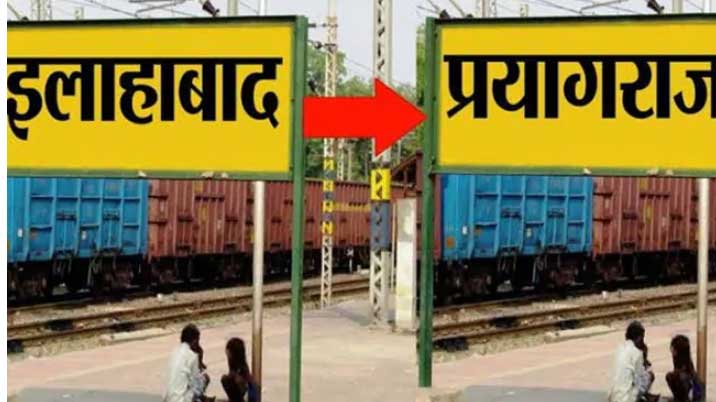
This unfamiliar term means ‘Scence of Place Names’ and traces origins and histories of place-names.The current saffron craze for changes in place-names purportedly associated with Muslim rule actually plays havoc with Toponymy,and by association,with history
Originating in a thirst for revenge against alleged ‘historical wrongs/injustices’, this mania actually sins against history.Colonial rulers sometimes failed to pronounce native names correctly,and changed the place names to suit their convenience.Following independence Indians reverted to original native names.That was justified as a method of decolonization.Since that name was used more colloquially by local folks,the process cannot actually be faulted.This is not revenge but restoration.
But when Allahabad is re-named Prayagraj or Mughalsarai as Deendayal Upadhyay Nagar it borders on the fanciful and becomes historically colour-blind.
Revenge in any case is ‘a kind of wild justice’,as Francis Bacon had put it four hundred years ago.The wildness is more pronounced in this epigram than justice,and we had better not slip back into savagery.It would be like,hypothetically,Zionists ravaging German cities to get their own back after having been massacred by Nazis.(Some of them appear to take it out by brutalising Palestnians!)
Actually the history of any country is layered by dominance of different races,and this is a natural course of things,except in the case of early Mongol raids that systematically destroyed entire civilizations and left ruins and deserts behind.
Indian history and culture also bear witness to such stratification,if one chooses to dig under their surface.Unlike geology ‘faults’ and admixture of strata are more common in cultural history,and many interesting and intriguing bits of evidence remain embedded in place-names.For example historians have shown us that Mughal rulers took a keen interest in ancient Indian heritage and Akbar’s Vizier Abul Fazl employed and supervised troops of learned Hindu Pundits translating and summing up ancient Sanskrit texts like the Ramayana and the Mahabharata and works of the ‘six systems of philosophy’ as well as the great Puranas.This enormous corpus was placed in the Mughal emperors’ library,obviously with the intent of guiding successive rulers and administrators in dealing sensitively with native subjects.Up to the time of Shah Jahan,this tradition appear to have been honoured.And Aurangzeb,late in life,apparently disillusioned with the project of ruling Hindus mainly in the light of Islamic ideas,wrote a famous letter bitterly criticising his chief tutor during his teenage years for neglecting to impart to him precisely that kind of knowledge.Audrey Trutshcke has uncovered evidence that Mughal rulers up till then showed a keen l interest in claiming legitimacy as trustees of this heritage.And come to think of it,Aurangzeb had the good sense to be more tolerant of orthodox Hindu beliefs and practices than he is given credit for.But current rulers seem hell-bent on obliterating names of all places,roads, historical sites,monuments associated with him,in some kind of monomaniacal fury.
And the intercourse went both ways.Historian Irfan Habib showed in a lecture some years ago that the letters of Hindu Mohants of prominent Hindu mutts and temples to the Mughal court included sixty percent words of Persian origin.Mirza Ghalib whom some scholars consider the prince of Urdu poetry of the pre-colonial times had a Hindu Kayastha as his chief disciple.
But the more dreadful thing is the complete oblivion and obliteration of the medieval syncretic movements that shaped Indian life and thought during four long and eventful centuries.This period is marked by the tumultuous revolutionary cultural surges impacting Indian social life and shaping it irrevocably.This period sees the vernacular versions of the Sanskrit epics and Puranas,sometimes under the patronage of Muslim rulers(Hossain Shah of Bengal) or neo-Hindu monarchs of tribal origin( Mahamanikya of Assam).The development of branches Prakrit into modern North Indian languages also took place during this historic period.Kabir in a famous saying quipped that Sanskrit had by that time become a ‘stagnant pool’ whereas spoken languages(‘Bhasha’) was ‘fresh,flowing water'( ‘bahta neer’).
It is during this period of natural historical change and evololution that ‘Varanasi’ had become ‘Benares’.It is simply ridiculous to think Mughals had imposed this name.Native Hindu speakers were already referring to the place by this name.Linguistic evolution,not imposition.If Allahabad has that name,it is because some Mughal ruler had founded a city there according to a certain pattern of urban life.People had accepted it for two or three centuries,and there was no call for alteration to a newly minted name.
This is not arbitrary refashioning of history,but a disdainful and fatally arrogant liquidation of history.Come to think of it, it is a strained and forcible abolition of culture.
PS: I owe the information on Aurangzeb’s letter criticising bitterly his old tutor to Dr Rajaul Karim of Nagaon,Assam.
Hiren Gohain is a political commentator









































